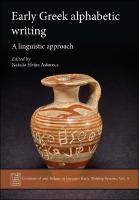Early Greek Alphabetic Writing
A Linguistic Approach
Author(s)
Astoreca, Natalia Elvira
Collection
Knowledge Unlatched (KU)Language
EnglishAbstract
Despite the flourishing of epichoric studies on the Archaic Greek scripts in the 1960s, embodied by archaeologists Lilian Hamilton Jeffery and Margherita Guarducci, most scholarship on early alphabetic writing in Greece has focused on questions around the origin of ‘the Greek alphabet’ instead of acknowledging the diversity of alphabetic systems that emerged in Geometric and Archaic times. The present book proposes to bring back the epichoric approach by focusing on the different ways in which the earliest epigraphic evidence represents the spoken Greek dialects. However, instead of continuing the palaeographic methodology of previous studies, this analysis follows the latest trends in grapholinguistics, more specifically the methodology of comparative graphematics. By examining the grapheme-phoneme relationships across Greek-speaking regions, it is possible to recognize that diversity and to draw connections with neighboring contemporaneous alphabets, such as those for Phrygian, Eteocretan and Etruscan. This work, carried out within the Contexts of and Relations between Early Writing Systems (CREWS) project, aims to contribute towards the conceptualization of the so-called epichoric scripts as independent alphabets, as well as their framing within the ecology of ancient Mediterranean writing systems. Contexts of and Relations between Early Writing Systems (CREWS) is a project funded by the European Research Council under the European Union’s Horizon 2020 research and innovation program (grant agreement No. 677758), and based in the Faculty of Classics, University of Cambridge.
Keywords
Foreign Language Study; Ancient Languages; Language Arts & Disciplines; Linguistics; History; Ancient; GreeceISBN
9781789257465Publisher
Oxbow BooksPublisher website
https://www.oxbowbooks.com/oxbow/Publication date and place
2021Grantor
Imprint
Oxbow BooksClassification
Language teaching and learning
Linguistics
Ancient history


 Download
Download